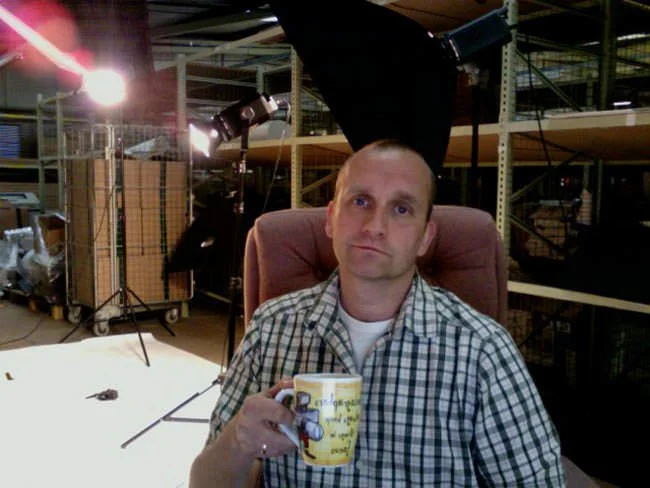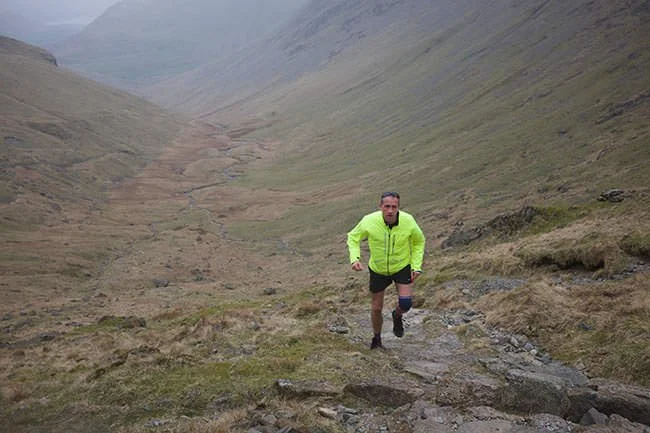Fit for purpose
Taking one’s health for granted is the #1 issue for almost everybody I know. For the record, I’m 55 years of age, and before this lockdown situation I generally went out to do my job six or seven days a week – less in the off-peak months, but often 7 days a week in those April to October months, leaving after getting the kids go to school, returning in the early evening, and sitting in my “cloffice” until the early hours. The work is demanding, with bouts of repetitive tasks, stressful journeys between jobs, some heavy lifting, and full of challenging situations that require instant decisions. It’s really a young person’s game, but I’m more than fit enough to cope with the physical demands of the role. It wasn’t always so however. Look at this following photo.
This was taken in the Langdale Valley, Lake District in about 2007. That’s our old mutt Elvis with a backpack on. At that point in my life, I was weighing in at around 84kg (about 13.5 stone), though I never weighed myself. Because I have a naturally thin frame, my body fat was being evenly distributed throughout my body. Years of neglect and overeating were doing all sorts of damage without me being aware of anything going wrong. It wasn’t unusual for me to head to McDonalds to get two burgers, fries, Coke, and have a full-on evening meal plus a bottle of red wine. I did absolutely no exercise right through my twenties and thirties, apart from a bit of fell-walking on holidays etc. I knew I was getting fat, but didn’t respond to my own concerns, and the people around me still regarded me as being skinny.
Just before my diagnosis
During a routine medical examination in the autumn of 2011, a urine sample caused my GP to pause for a few seconds. “There’s glucose in your pee – we need to get a blood test done” she said. I’d been working in the raging heat of a clothes warehouse without any ventilation all summer – right under the corrugated steel roof, so that the heat from the sun radiated down into the void below. The stifle was unimaginable, and I began feeling unbelievable thirsty and drained of all energy. To self-medicate, I went to the vending machine and got a couple of bottles of Lucozade and a Mars bar. These made no difference, so I got more. It was a cycle of consumption that I couldn’t win, and I spent my nights awake, with constant visits to the toilet & tap. The news came back shortly after my blood test – I had copped for Type 2 Diabetes at the age of 46. Gutted.
For those unacquainted with the condition, it is simply the body’s inability to regulate the glucose in the blood which is produced by your liver when you eat carbohydrates. The glucose is the energy used by every cell in the body, and is regulated by Insulin – produced by the Pancreas. In a healthy body, when you need energy, your cells absorb the glucose they need, and store any excess as fat. In my body, the glucose was partially locked out of the cells, so my energy levels dropped significantly, and the excess kept on circulating – effectively making the blood “sticky”, blocking the smaller blood vessels in the eyes, kidneys, nerve endings etc.
I was sent on a DESMOND course – which gives a newly diagnosed diabetic the information required to manage the condition – without medication in my case. I was a bit sceptical about the dietary advice, even after a few appointments with an NHS dietician who insisted that I base my diet on carbohydrates such as wholemeal bread, pasta and rice. This seemed to contradict everything I understood about the condition, and I began to realise that prescriptive treatment was geared towards people who took regular medication to control the spikes in blood sugar after eating. I was on my own from thereon in.
With a major change in diet, the weight dropped off significantly. Roll on a year, and although still a bit overweight, I’d lost the podge that had caused my illness in the first place. My long term blood sugar (a measurement known as HbA1c) dropped from the initially dangerous 115mmol/l to 50. A non-diabetic would be in the range of 25-35. Still some work to do.
running in the Lake district
Running made a huge difference to my overall wellbeing. The first two months were absolutely awful. I’d been a contender in my day, but when I headed out on that first jog, I managed 200m before feeling physically sick. I stuck with it though, and within 8 weeks I was regularly running 5-6 miles about 3 or 4 times a week. The physical and psychological transformation was incredible. I dropped to 64kg – a smidge over 10st, clothes began to fit properly, sleep came naturally, and my self-confidence increased as well. At the same time, I began to follow a non-strict ketogenic diet – limiting carbohydrate intake to 20g a day ( There are 21g in one slice of white bread ). The human body isn’t designed to cope with the consumption of processed carbs, and this is all pretty common-sense stuff. Even though I felt, and looked way better, it was interesting to note that the fat folk around me started to criticise me – noting that I didn’t look healthy. WTF?
At my lightest since my teens
It’s now become perfectly normal to be overweight. I know exactly how it happens because I was overweight – it’s a combination of the time pressures of work commitments, self-medication during non-work periods because of the stress associated with those pressures, the constant bombardment by advertisements promoting sweet and fatty stuff, a shift in retail tactics to persuade bulk-purchases, and the most important – the massive, massive increase in the availability and consumption of alcoholic drinks through all age groups. I’ll bet your mam and dad didn’t get through £200 of beer and wine a month in the 1970’s.
So – back to the point. Looking after yourself is vital if you want to be able to get out there and do your thing. You don’t need to give up beer, and it’s fine to splurge here and there, but this constant over-consumption is killing us slowly and painfully. The strain on the NHS because of self-inflicted conditions & associated issues could be alleviated massively by everyone taking some simple steps, but you need to take them before you get too old. The denial of ageing is a natural trait, and often it takes a shock to realise that you can’t keep on drinking heavily and eating rubbish. Unfortunately this shock usually takes the form of a heart attack, mini-stroke, or diabetes/heart disease diagnosis in early middle-age. I have to live with my condition now, and I’ve been told it could shorten my life by 10 years, even with strict management. I'm in one of the "high risk" groups with regard to the Coronavirus. and my eyes are slightly affected by diabetic retinopathy, which directly impacts my ability in my chosen career. In addition, I’m at greater risk of Alzheimers & Parkinsons in later life – all because I let myself go for 20 years. It’s never too late to lose the beef. Do yourself, and your family a favour, and lose it.



